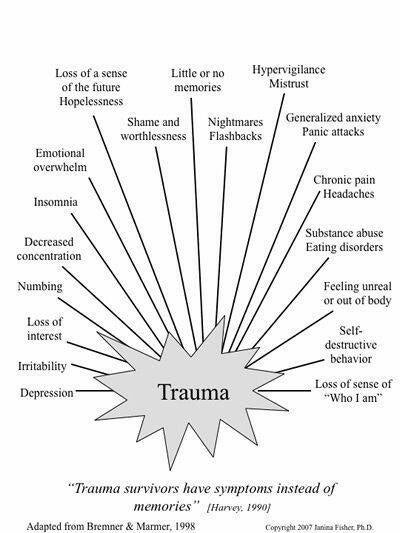Trauma pt. 1

Trauma is the response to a deeply distressing or disturbing event that overwhelms an individual's ability to cope, causes feelings of helplessness, diminishes their sense of self and their ability to feel the full range of emotions and experiences.
3 types of Traumas
- Acute trauma: This results from a single stressful or dangerous event.
- Chronic trauma: This results from repeated and prolonged exposure to highly stressful events. Examples include cases of child abuse, bullying, or domestic violence.
- Complex trauma: This results from exposure to multiple traumatic events.
Secondary trauma is another form of trauma. With this form of trauma, a person develops trauma symptoms from close contact with someone who has experienced a traumatic event.
Family members, mental health professionals, and others who care for those who have experienced a traumatic event are at risk of secondary trauma. The symptoms often mirror those of PTSD.

In this article I will talk about Secondary Trauma and Acute Trauma. Acute Trauma could come in the form of a car accident, natural disaster, a single event of abuse or assault, theft, witnessing a violent event or an experience that threatens an individual's physical or emotional safety.
My family and I drove by a car accident yesterday morning. It had just happened so everything was still fresh, the people involved were still on the scene. The police had just arrived. As I was analyzing what had happened, and noticing how damaged the car was, my body suddenly went numb and i felt some chills.
5 years prior to this my parents had been involved in a car accident, my mom was paralyzed in the hospital for some weeks, she had to learn how to walk again. This was a traumatizing time for me I barley remember much. So when I saw the car accident yesterday I was triggered. It took me some time to process everything and recollect myself. While my parents who were the ones who were involved in the accident (5 years ago) seemed to have gotten over it quick. My dad was driving yesterday but so was my mom. Because of that car accident (5 years ago) my mom is very cautious about the way people drive, she will break in the passengers seat. And she will vocally tell you how to drive. My dad seems to not have been affected outwardly by the car accident (5 years ago) even though he was the one driving that day.
Trauma affects us all differently. You can go through something and feel delibitated by it. Someone else can go through the same exact thing or even "worse" and not feel delibitated by it. Everyone processes things differently, Your trauma is valid regardless.

My secondary trauma seems more delibitating to me than my moms acute trauma. The thing about trauma is that it does not just go away. You can work through your triggers but the person you were before this happened will not come back. I will talk more about this in trauma pt. 2. You may think you have healed and years down the line suddenly you get triggered.

Trauma generates emotions, and unless we process these emotions at the time the trauma occurs, they become stuck in our mind and body.
How to process it:
- Ground yourself
- Name it
- Feel and experience it
- Receive its message and wisdom
- Share it
- Let it go